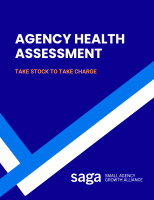There is no reason to take on all of the stress and risk of owning your own agency if you aren’t getting what you want from it.
Too many agency owners let the business drive them rather than putting the business to work in service of their own personal goals.
The Build to Own mindset focuses on defining your own ambition and then using it to guide critical decisions about the direction of the agency.
To gauge how well your agency is aligned with your own ambition, you can ask yourself five key questions.
Are you satisfied with the number of hours you work each week?
One of the most frequent complaints that agency owners express is the amount of hours that they need to put in to make their agencies successful. Being honest with yourself about how much time you are putting in – and how much time that you want to work – goes a long way toward improving your overall satisfaction.
There will be periods of time where you will likely need to work more hours than you prefer. Early in the agency’s life, this may be more common than as you grow and have more systems and team members in place. But even then you shouldn’t accept that every week must be a slog.
If you aren’t satisfied with your workload: start mapping out a plan to reduce your hours – even if it is just an hour or two less each week. Set clear limits and see if it helps you triage away tasks that aren’t absolutely necessary. If you feel like there is no way to trim your time and still turn a profit, then you likely have a pricing problem that you will need to address first.
Are you satisfied with the kind of work that you personally do?
Just as you should be working the amount that you want, you should also have the ability to do the kind of work that you enjoy and find fulfilling. We all have tasks that we would prefer not to do, but this question is designed to get you to think about how you spend the majority of your time. As the owner and boss, you should be able to create an environment that allows you to have the role you want and enjoy.
There is no single answer for what your role should be as the owner. Some agency leaders want a substantial client service role to flex their creative muscles, while others enjoy growing the business and focusing more on business development. As a small agency, the owner usually must have at least some involvement in all aspects of the business, but you still have a lot of room to customize your role to meet your own ambition.
If you aren’t satisfied with your current role: write a job description that outlines what you do now and then write a second one that matches what you would like it to be. That provides a roadmap for you to begin making changes over time to get you to where you want to go. Now you can start making more definite plans for how to achieve that and setting a timetable for that evolution.
Are you satisfied with the amount of flexibility that you have to take time off?
The stereotype of anyone who works for themselves is that they have total flexibility to do whatever they want whenever they want. Anyone who has owned an agency can tell you that isn’t actually true. The question is how close to that reality are you today – and how much closer do you want to get to it.
You should have the flexibility to meet the requirements of your personal and family life on a weekly basis, as well as to carve out time for the vacations that you want to take. I have even worked with small agency owners who structured longer duration sabbaticals – it just requires careful planning and the right systems to get you the flexibility that you desire.
If you aren’t satisfied with the flexibility your agency gives you: define more precisely the flexibility that you want. What does flexibility mean to you? What are your vacation plans (or goals) for the next year or two? Then ask what would need to be in place in terms of systems or support to enable those objectives to be met.
Are you satisfied with the amount of money you earn from the agency?
You’re not just an agency owner, you’re also an employee of your business. Often, owners will simply look at the business bank account and ask themselves how much they can take out for themselves. Instead, you should be setting a reasonable compensation level that both reflects the market value of your service to the business and helps you to meet your own personal financial commitments.
It’s important to remember that you should be paying yourself for two roles within your agency: compensation for the services that you are providing as an employee and dividends for the risk you take as an entrepreneur. The latter can fluctuate over time as you consciously impact profitability at different stages of growth, but you should never compromise your compensation as an employee.
If you are not satisfied with the amount of money you earn: set a fair monthly compensation figure for your work as an employee. It should represent both a fair market value for your services (the amount you would pay someone else to do the work) as well as meet your minimum financial obligations. Pay yourself on the same schedule as the rest of your team – without exception. If you don’t have the funds to support that, then you will need to evaluate project profitability to determine if you need to constrain costs or raise prices to get to where you want to be.
Are you satisfied with how well-prepared you are for your retirement?
Your business can (and should) help to fund contributions to your retirement accounts. In addition, you may be considering selling your agency to obtain additional value for what you have built. The latter course of action is far from a sure thing, so agency owners ought to make certain that the money they can set aside while owning the agency provides for a sufficient retirement, with any sale proceeds only serving as gravy.
The vast majority of agencies do not end up getting acquired – and those that do often sell for far less than the owner may have anticipated or hoped for. If you set aside a portion of your compensation and profits for your eventual retirement (or other life goals) then you will be in a stronger position to evaluate potential deals and negotiate more favorable deal terms because you won’t feel the pressure to sell at any price.
If you aren’t satisfied with your retirement preparedness: determine how much you need to be setting aside each year in order to meet your goals. Calculate the gap between that number and what you are presently contributing to determine what it will take to get to the new number.
Conclusion
Understanding your Ambition as an agency owner is the first step in the AIM-GET Framework for a reason: it is the foundation of good decision-making that will help you develop a Build to Own agency.
The five questions outlined in this article represent a good starting point for determining how well your agency business is performing today against your own goals.
But they are just that: a starting point. You likely have other goals for yourself and the business that should be part of your calculation.
After you evaluate the current alignment of your agency to your personal goals, you can begin to move on to other aspects of the business. SAGA’s Agency Health Assessment can help you to look at some of the key drivers of success to identify other areas you may wish to focus on for improvement.










